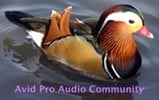
 |
Convert 16-bit session to 24-bit session?
Dang it...I started a song at 16-bits never figuring it would be used for anything but a rough demo, but now the client wants to use what we've done in 16-bits for the master.
Any way to change the session to 24-bits? Will I have to do a new session and then import session data from the current one? |
Re: Convert 16-bit session to 24-bit session?
Consolidate all the audio tracks and import into a new 24 bit session. There's no way to convert the present session AFAIK.
|
Re: Convert 16-bit session to 24-bit session?
When you use the "File>Save Copy In" command, it creates a copy of your session and allows to define new session parameters such as Pro Tools version/ Audio File Type/Bit Depth/Sample Rate etc..
If you only make the one change to "Bit Depth" you'll be creating a copy of your session, but in 24 bit. *Just make sure to check the box for "All Audio Files" under "Items to Copy". |
Re: Convert 16-bit session to 24-bit session?
Thanks. I'll give that a try.
|
Re: Convert 16-bit session to 24-bit session?
Why, What's the benefit if the recording has already been done?
|
Re: Convert 16-bit session to 24-bit session?
I tried the Save Copy In... and it worked! If you select 24-bits for your new session (coming from a 16-bit session), it automatically forces you to copy all files anyways - which makes sense. Thanks Night Train!
(I wasn't clear in how much of the recording had been done already) The benefits I can think of are at least these: 1. Although I have the guitar, drum tracks (from Drumcore) and an imported bass track at 16-bits, I don't have the final lead or background vocals, so the new vocals would benefit. 2. There will also probably be an overdubbed acoustic guitar and who knows what else (handclaps or some other live percussion). 3. The Native Instruments B4II sounds should benefit from the 24-bit resolution. VI's in general should sound better. 4. My Reverb and Delay plugins should sound better as well. 5. I THINK the plugins (EQ & Compression) on the 16-bit tracks will sound better because they now have 8 more bits with which to calculate changes and output those changes (more precision). 6. Certainly plugins on the master fader will benefit when summing tracks. Overall, the track does sound "bigger" in the new session, but that may simply be wishful hearing.... ;) |
Re: Convert 16-bit session to 24-bit session?
Quote:
|
Re: Convert 16-bit session to 24-bit session?
When a file changes from 16 bit to 24 bit, does it "up-convert" (meaning some more serious math) or does it "un-truncate" (meaning just tacking on the extra bits)?
The reason I ask is that I have read the when you go from 24 to 16 (truncating) that unless you use dither, the last 8 bits are simply hacked off.. I'm not sure that this is the whole story here... I would think that simply adding the extra bits might have implications for the dynamic range of the new, 24 bit files... ie they might only get so quiet before you have a constant noise floor or a cliff (if you follow me..) |
Re: Convert 16-bit session to 24-bit session?
Quote:
1. Any new Audio Suite processing will preserve 24 of the process's output bits rather than only 16. Remember, that means preserving 256 times as much resolution! Well worth it. 2. Any fades/crossfades will be made at 24 bit, which will make them sound much smoother. 3. Any new audio recorded will be captured with much greater detail. 4. Any stems (submixes committed to audio) done during mixing will benefit greatly. Any audio files left unchanged will simply have zeros stored in their eight least significant bits, and should sound exactly the same as they did in the 16-bit session. If you want your EQ plugs (except those that oversample) to sound better, convert to a higher sample rate. Sample rate is a time-domain attribute, while bit rate is an amplitude domain attribute. That is, a higher sample rate improves frequency resolution, while a greater bit depth improves dynamic resolution. If I understand right, PT's mix engine always uses the same high bit depth, but the sample rate varies with the session. Some plug-ins do their own oversampling, but they still have to convert back down to the current session sample rate to pass the audio on to the next plug-in or to the mix path. |
Re: Convert 16-bit session to 24-bit session?
flommer - you're thinking in the right direction. You're right that converting from 24 to 16 bit w/o dither simply hacks off the last 8 bits. Similarly, when converting from 16 to 24, 8 new bits get simply "hacked on." :-) If a bit was 1111111111111111, it's 24 bit form will be 11111111111111110000000. The bit stream it's a part of will sound exactly the same. However, if you process it in any way, you'll benefit from the ability to store the result of the math 256 times more precisely.
|
| All times are GMT -7. The time now is 10:20 AM. |
Powered by: vBulletin, Copyright ©2000 - 2008, Jelsoft Enterprises Limited. Forum Hosted By: URLJet.com